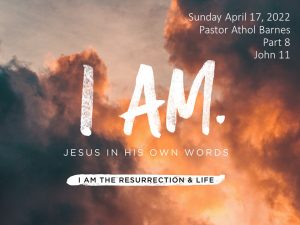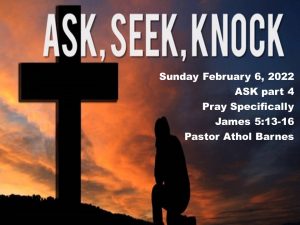
In John 11, we read the account of Jesus raising Lazarus from the dead, and in John 11 verse 25, Jesus says, “I am the resurrection and the life…”
I want to make three observations from this amazing chapter.
First, why does God sometimes wait to answer our prayers?
In verse 6, we read that after receiving the news of his sick friend, Jesus decides to wait two days before travelling to Bethany. Jesus tells the messenger that Lazarus will not die.
From verse 5, we know that Jesus loved this family. The delay in responding to their prayers was not a denial of his love.
As we look at this account and apply it to our lives, we are the Mary’s and the Martha’s. We are praying for a miracle, and our Lazarus is something or someone that we hold dear and fear losing.
There are times in our lives when we cry out to God for a miracle, for a life situation that seems to be getting desperate, and we need God to save our Lazarus.
How often have you prayed asking God to intervene, but He did not respond immediately? We know God hears our prayers, but the answer is, “wait”.
Secondly, from John 11:20-27 and 32-37, it seems that sometimes God acts too late.
Note the sequence of events. After receiving the message, Jesus waited for two days and then traveled to Bethany. When he arrived, Lazarus had been dead for four days. This means the messenger must have taken a day to travel to Jesus, Jesus took a day to travel back to Bethany, and Lazarus must have died after the messenger left. So, when Jesus said, “This illness does not lead to death,” Lazarus was already dead! Did Jesus make a mistake? Or did Jesus mean something else?
The sisters noticed this (see John 11:21 and 32), and the people grieving with the family also noticed (see John 11:37). At times, this same tension exists in life. We are told that Jesus loves us. Yet we wrestle with unbelief when we don’t receive the relief from pain that we are asking for. And Satan loves to throw in seeds of doubt into our minds.
The Bible is full of accounts of men and women who suffered long after praying for a miracle. Why does God do this? Jesus said: for the glory of God! In John 11:4b Jesus said, “It is for the glory of God, so that the Son of God may be glorified through it.”
Instead of answering their prayers, Jesus showed empathy and deep emotion for their pain. Jesus feels and understands our pain (see Hebrews 4:15-16).
At times it may look like God has failed you, but He will never leave or forsake you. He is faithful to minister to you.
Jesus knew that Lazarus would soon be raised, and that their grief would turn to joy. Yet he took time to grieve with them. Jesus wasn’t putting on a show of emotions, and in verse 33, we read that Jesus was “deeply moved”. The Greek word means “indignant” or “enraged.” Jesus hates death, and he was angry at the suffering and grief that it caused. Jesus hates the effect of sin in the world, and death was not part of God’s original plan. Jesus came to defeat death, and he knew this was his enemy.
Jesus said to them in verse 23, ‘Your brother will rise again.’” Remember earlier on he said, “This illness does not lead to death.” It must be hard to trust what he is saying or promising the second time.
From the declaration of Jesus in John 11:25-26, we know that those who believe in Jesus will receive the resurrection power and life that is in him. They may die in the flesh, but we know that eternal life is found in Jesus (John 5:24, ESV). Those who believe in Jesus have passed from death to life. We were spiritually dead, but in Christ we are made alive in the spirit.
In verse 26, Jesus asked Martha, “do you believe this?”. To which she responded, “Yes, Lord; I believe that you are the Christ, the Son of God, who is coming into the world.” What a powerful declaration! Do you believe this?
Finally, we read in verses 38 to 44, that Jesus always keeps his promises. Jesus arrived at the tomb and requested that the stone be removed. Martha protested, struggling to trust Jesus again.
Jesus called Lazarus, and he came out from the tomb alive! Martha and Mary’s faith was vindicated. They simply chose to trust Jesus again.
God keeps His promises, and we can trust Him even when we don’t understand. God will fulfill His promise in His timing and for His glory!
As followers of the one and only person who is the resurrection and the life, we don’t have to fear death. Eternal life starts the moment you give your life to Christ.
Maybe today, you have already made Jesus Lord of your life, but you are wrestling with your faith. You have asked for something, and he seems to be waiting. Even though you have the faith that he is able, it seems that the miracle is still not coming.
And just maybe it seems too late, the miracle that you were praying for seems to be too late. I want to remind you today of Psalm 145:13,
“Your kingdom is an everlasting kingdom,
and your dominion endures throughout all generations.
The Lord is faithful in all his words
and kind in all his works.”
God keeps His promises. He is never late, and we can trust Him with the outcome, even when we don’t understand it.
We serve a risen Savior, and one who always keeps his promises!




